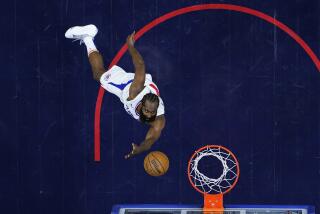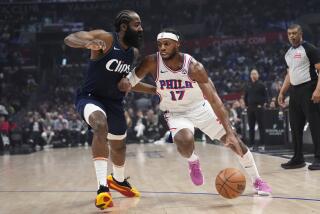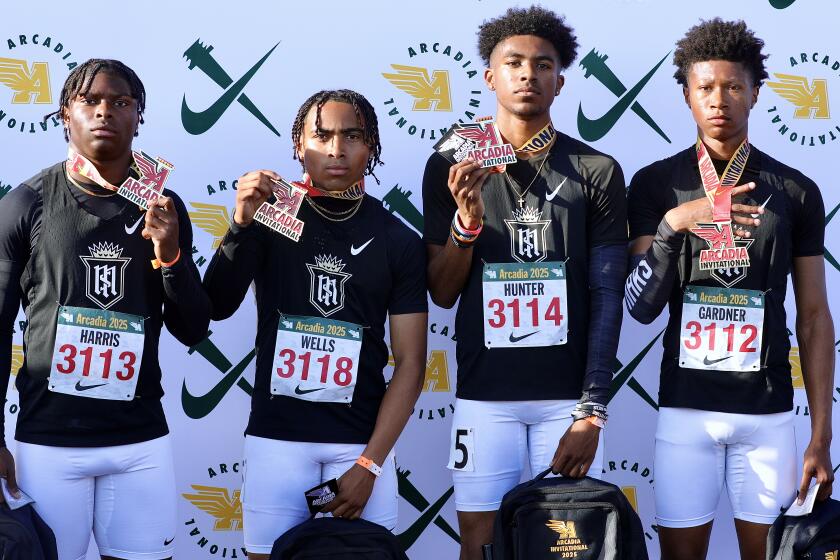Despite Obstacles, the 76ers Are Still Winning
- Share via
PHILADELPHIA — Anyone requiring evidence of the good life enjoyed by the Philadelphia 76ers around the turn of the decade needed to look no farther than the parking lot outside their practice facility at St. Joseph’s University.
Mercedes-Benz was the vehicle of choice, closely followed by BMW and Porsche. The racy wheels were very much in keeping with the team’s sleek on-court image. In the 10 seasons before this one, no NBA squad had a better record than the 76ers, who were runners-up in the league championship series in 1977, 1980 and 1982 before they finally won the title in 1983.
Today, a walk through that same parking lot shows the changes that the 76ers have undergone. There are Datsuns, Toyotas and even Chevys. Workmanlike cars for a workmanlike team that has performed better than anyone could have envisioned after a 50% turnover from last season’s roster and a series of potentially devastating early-season injuries.
“They’re good. They’re deep. It’s scary,” said Milwaukee Bucks Coach Don Nelson, whose team was one of the first to be surprised by Philadelphia. On Nov. 5, playing without power forward Charles Barkley and center Jeff Ruland and using just eight players, the 76ers defeated the Bucks, 107-101. Then on Dec. 3, as if to prove it wasn’t a fluke, they again beat Milwaukee, 115-110, in overtime.
“Most teams can’t play that many people,” Nelson said. “We can only go about seven or eight deep. They can play 10 with no problem.”
That’s certainly a change from recent seasons, when the Philadelphia story starred Julius Erving, Moses Malone, Maurice Cheeks, Andrew Toney and Bobby Jones. Jones retired at the end of last season; Erving says he will depart after this one. Malone was traded to the Washington Bullets, and Toney, hobbled by foot problems the last two seasons, plays sporadically.
“There are only three of us left, only three from the heyday team (of 1983),” Toney said recently. “And we’re going down quick.”
But not without a fight. Cheeks, the quiet leader who may be the best pure point guard in the league, still provides the glue. Now he is teamed with players more pugnacious than stylish. Of course, Ruland, the former battling Bullet, personified that spirit. But the problems with his left knee that ruined his last two seasons in Washington have continued, sidelining him and placing his career in jeopardy.
Barkley, never known to shy away from a scrap during his three-year NBA career, missed much of the exhibition season after he cut his heel in a locker-room accident. He also missed a week early in the regular season after he suffered a bruised spleen in a double-overtime game against the Indiana Pacers. Typically, Barkley played 53 minutes in that game and then protested vigorously when he learned he had to be hospitalized the next day.
Less than a week after his return in late November, the now-muscular mound of rebound had 31 points, 21 rebounds, 9 assists and 7 blocked shots in a game against Portland. For the season, Barkley is averaging 24.8 points, 13.2 rebounds and 6.1 assists.
“It was a scary thing,” he said of the spleen injury. “I’m scared now, but I don’t think about that when I’m playing. Once I’m out there, I just worry about winning.”
Others throwing caution to the wind are forward Cliff Robinson, who has played all season with a slight separation in his right shoulder and center Tim McCormick, who like Ruland has knee troubles. But Robinson, who came here from the Bullets with Ruland in the deal for Moses Malone, Terry Catledge and two No. 1 draft picks, thinks the run of injuries actually has helped the 76ers’ cohesiveness.
“It gave the rest of us a chance to establish ourselves,” Robinson said. “Roy (Hinson, another power forward acquired from Cleveland last June in exchange for the No. 1 pick in the 1986 draft), myself, McCormick--we got more involved when the people they were counting on went down.”
The situation also enabled Philadelphia to develop more flexibility than perhaps any other team in the NBA. Erving has played small forward and big guard, Hinson forward and center, Toney the point- and off-guard spots, and so on down the roster. When other talents such as Danny Vranes and rookie David Wingate--formerly of Georgetown--are thrown in, it is easy to marvel at the team’s athletic ability. Forward Kenny Green, the Bullets’ No. 1 draft pick in 1985, is the 76ers’ 11th man.
Like the Bucks, the 76ers rotate their athletes to make up for the lack of a dominant center, alternating players in the pivot, depending on the opposition.
“What we have to do is make sure it’s the right person against the right matchup at the right time,” Coach Matt Guokas said. “After that comes ball movement and selflessness, things like that. Our guys have been great in that regard.”
As a rookie head coach last season, Guokas decided to put Erving in the back court full-time, a move that helped immensely. This season has produced more challenges, but Guokas has dealt with virtually all of them effectively.
“When you look around, everybody, with perhaps the exception of Boston, has undergone changes,” he said. “We’re just getting to the point where hopefully we’re coming together as a team. Our training camp was very insignificant. We were just flailing away. We didn’t accomplish a thing; we just wanted it to be over with. We’ve done all right in the regular season so far.”
When the season started, Barkley, a habitual NBA leader in technical fouls, said he was going to control himself. “I’m not outrageous anymore,” he said recently. “I’m trying to become a nice guy.”
Part of the reason for his change in style was that he wasn’t sure what kind of backup there would be for his boasting, given the 76ers’ personnel turnover. Now, try as he might, Barkley finds himself opening up, especially when it comes to Malone and the season series with the Bullets, the first game of which will be Christmas night in Philadelphia.
“We’re not even worried about the Washington Bullets--they only average 60 points a game (actually, 103). We don’t even think about them,” Barkley said. “Now Moses, he says they’re gonna win. I say we’re gonna win. Both of us can’t win; one of us is lying.
“But I’ll tell you what, he better bring more than 60 points a game with him, though. The race is on and he’d better get out of that Volkswagen and get into something faster. You can’t catch a Mercedes in a VW.”
Perhaps the more things change, the more they stay the same after all.
More to Read
Go beyond the scoreboard
Get the latest on L.A.'s teams in the daily Sports Report newsletter.
You may occasionally receive promotional content from the Los Angeles Times.










